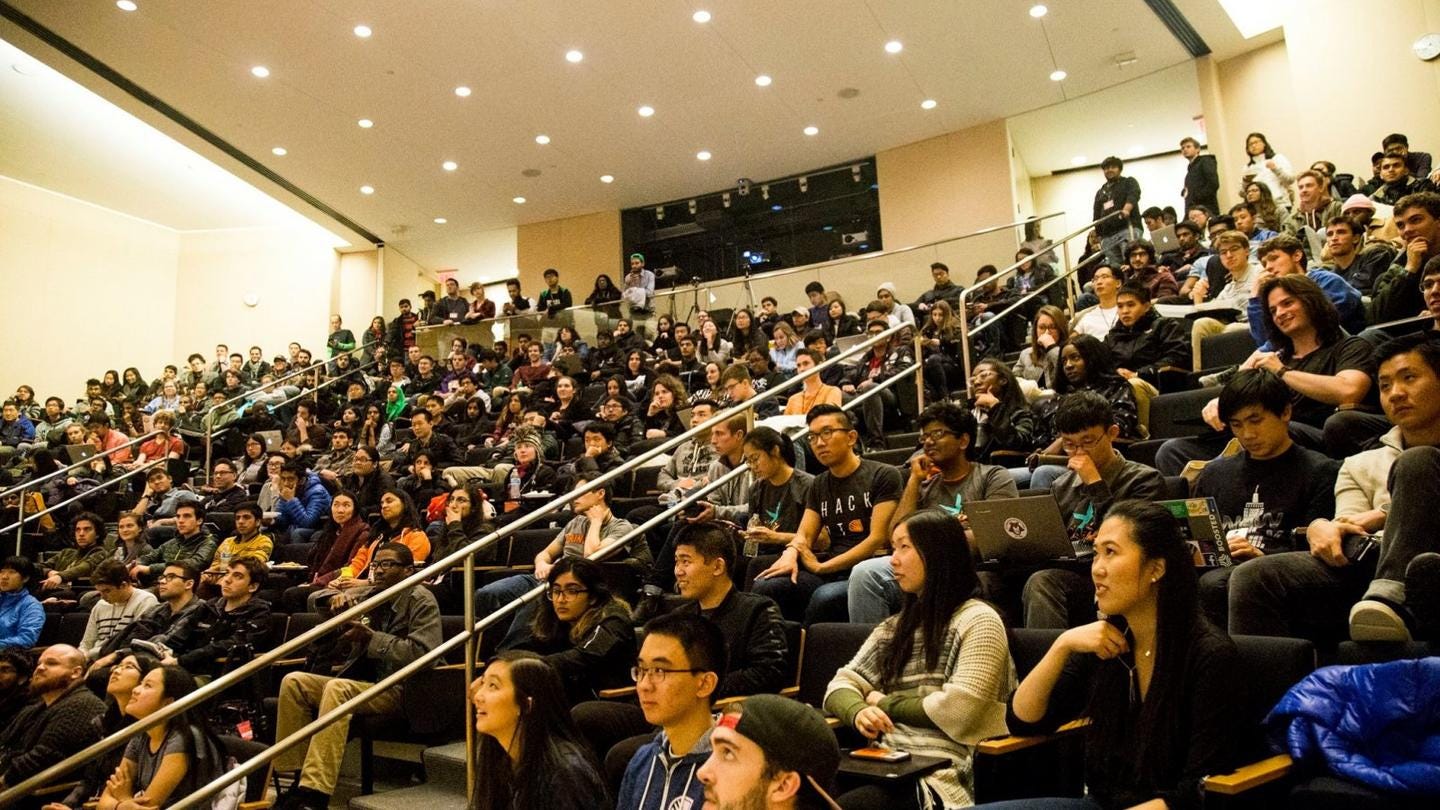You are at the inflection point
The surprising key to a fulfilling career? Climb the most interesting mountain
I was invited to keynote for HackPrinceton earlier this month. I was asked to do this approximately two days beforehand, so I quickly cobbled something together on the flight over.
There are a lot of related ideas from my big philosophical treatise that I tried to distill into a ten-minute talk. Some students came up to me afterwards and thanked me, so it seems like my talk was at least somewhat useful.
I unfortunately neglected to record it, but here's a rough transcript of my talk.

Thank you to the organizers for having me — I know how much work it takes to put something like this together. The last time I was in this room, I'm pretty sure I was taking a final, so it's a weird feeling to be back.
Most keynotes tend to be delivered by someone really famous — and I get it, how else are you going get people to show up? But the issue is that they tend to be career retrospectives from people who have already made it, a hazy recollection of a thirty year career clouded by narrative fallacy.
I sat in your seats relatively recently, so I hope I can give you a better sense of the road that lies before you.
Many well-meaning people will advise people to set long-term goals for their career — figure out where you want to be in 30 years, and chase it! Chase it and never quit; after all, winners never quit, and quitters never win. It turns out that this is bad advice.
I think about pursuing a career like climbing a mountain. Imagine two college students: Ariel, who is purely goal-oriented, and Brooke, who is process-oriented. Ariel, being the hyper-ambitious, goal-driven person she is, decides that she aspires to be the CEO of a prestigious company (her mountain). She begins climbing towards the summit, enduring all the horrible pain through the climb, as she is entirely driven by the thought of reaching the top of the mountain.
For Ariel, the story generally ends in two ways. In one, the far most common scenario, Ariel succumbs to the brutal pace she has forced upon herself, burns out, and never gets close to the summit. For the sake of this story, let's think of the latter case where she reaches the top.
Thirty years later, Ariel has finally clawed her way to the top of her mountain — she has a comfortable, prestigious job — but still, she feels empty. Although she got to the top, she never asked herself what she truly wanted in her life. Instead, she chased a goal that a twenty year old decided for her: her 20-year-old self. In the years she spent chasing this goal, the world had also changed dramatically — the company she now leads is an antiquated relic of the past.
For the first time, she's had the chance to reflect, and Ariel sees many mountain peaks that she had never seen before, ones that appeal to her much more. It dawns upon Ariel: she had spent her entire life climbing the wrong mountain.
Brooke had gone about this a different way. She asked herself what she was truly most interested in, and began climbing the mountain following that. Brooke walks deliberately, focusing on taking the path step-by-step. She sees the top of the mountain but is not blinded to everything else around her through this time. At first, Brooke spent some time climbing this mountain, but once she ascends higher up the mountain, she was able to see more. Brooke then realizes that this was not the actual mountain she wanted to climb — her interests have changed. She takes a few steps down the trail, hops over to the next mountain, and begins ascending the new mountain the same way she did before: step by step, bit by bit.
The difference is that Brooke had a deliberate process, while Ariel did not. Ariel might have been more driven and had more intellectual horsepower, but _she was chasing a past that no longer existed_. Ariel lived in a state of continuous failure; it wasn’t until thirty years later that she had finally “succeeded,” only to find out that this wasn’t what she wanted. Plus, in her feverish climb to the top, she had never taken any time to enjoy the hike — that possibility had never occurred to her.
I often step back to look at my career, in the context of the mountain.
A few of the checkpoints in my life:
I majored in ORFE at Princeton
My senior thesis focused on natural language signal processing
I worked in quant finance
Now I'm investing and building in AI
What's the connection between all of these — machine learning, or maybe AI? It looks like a pretty straightforward climb up the mountain so far.
It's easy to make that assumption, but the reality is a bit stranger.
The summer before my sophomore year, I lost 17 straight tennis matches against my friend. Naturally, I became obsessed with changing that.
I took the video clip of our closest match, spent weeks figuring out a way to encode tennis rallies as a tensors in a high-dimensional space, got a crash course in Python and its scientific computing libraries, and eventually ended up writing a twenty page paper with statistical analysis to determine an optimal strategy to win. I even dropped 20 pounds to execute this strategy. I called this Project Federer, named after my favorite tennis player.
Every single milestone in my career, has been directly linked to Project Federer. I wrote a follow-up tennis math paper, which connected me with my senior thesis advisor. I talked about Project Federer in every single one of my job interviews — when I asked my boss why he hired me, he told me: "After you talked about your tennis project, we realized we had never before encountered someone so maniacally-driven, so we hired you." There are similar connections between Project Federer and the opportunities that I've had at Stanford and in my current work at Altos.
The true tipping point in my journey so far, is not from traditional data science, but stemmed from an interest in tennis. I don't know what caused it, but Project Federer truly captured my imagination and pulled me forward.
Remember Brooke, the mountain climber? I'm convinced that her curiosity-driven approach is the way to do it. Do things because you like it and find it fascinating, because then you will stick with it forever.
The exact form of your interest may shift — because the world changes and you do too. But when you stick with things for a long time, your skill compounds and more opportunities arise. It's remarkably simple, but not easy.
People tend to avoid this approach because of its perceived risks: you won't know exactly how it will pay off, or when.
However, I assure you, it will pay off. And because of the exponential nature of compounding, it will take you to heights that you never even thought possible.
But more importantly, because you find it fascinating, you will enjoy the process.
Rather than suffering through the entire time like Ariel, be like Brooke.
The most interesting journeys come from the smallest, most surprising beginnings.
The key is to keep your interests alive. Don't fixate on what you "should" be doing — obsess about learning more about the things you find interesting.
Spend time with people you find interesting. For this HackPrinceton, I've heard that people have come in from really far away: from all over the US, from other countries, and even all the way from Forbes. Wander along the mountain, and go deep into what fascinates you — that learning will compound.
Almost ten years ago, I was working on a project during HackPrinceton. It didn't win any awards like your projects are going to, but it was important to me. I'm pretty sure I skipped the keynote speech too, because I was too busy labelling data or something.
This particular project was actually Project Federer, the tennis project that kicked off everything.
And like I told you, I didn't stop there, even though it didn't make sense that an engineering student was spending more time on tennis than a varsity tennis athlete. But the fire continued to burn, so I continued to feed it.
And now, a decade later, I have the chance to share this time with all of you today.
Whether you're starting a new side project today, or you're honing something you've been working on for a long time, the message is the same: go forth. Choose the most interesting path. Let curiosity be your compass as you climb your mountain.
As long as your own personal flame of interest is ignited, follow that path. And a few years later, when you look down from the top of whatever mountain your curiosity led you to, I hope you think back to this moment, where it all started.
And I know I speak for everyone here — we can't wait to see what you build and what mountain you climb.
Thank you, HackPrinceton.
If you enjoyed this piece, you might like this one too.
An opinionated treatise on a life well-lived
I wrote the core of this piece in 2017 when I was mired in existential dread during my junior year at Princeton. This is an amalgam of pieces of advice and principles that I've synthesized over high school, college, and the first few years of my career. This is very much an aspirational work too — it serves to remind me what my principles are, and why I…

